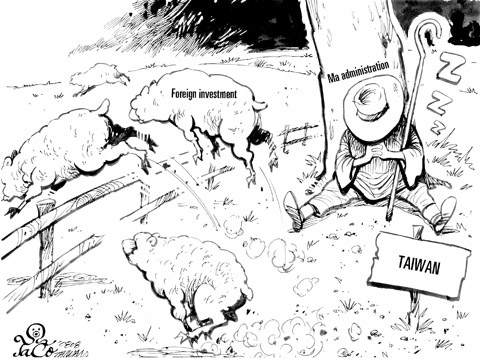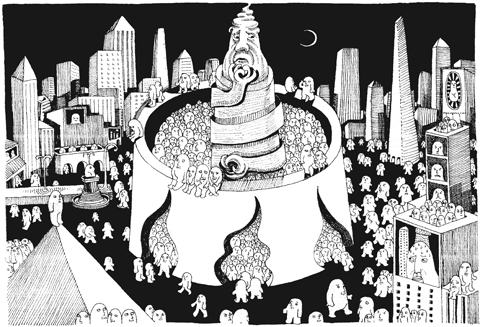|
|
| More than 700
residents from Jinshan, Shihmen, Sanchih and Wanli townships protest in
front of the Environmental Protection Administration yesterday against
Taipower’s plan to build a storage facility to store spent nuclear fuel
in dry casks in their neighborhoods.
|

Another
slap in Ma Ying-jeou’s face
Thursday, Aug 28, 2008, Page 8
“It takes two to tango.” So said President Ma Ying-jeou (馬英九) in an interview
last Thursday with the Chinese-language Global View magazine when asked if his
administration had wishful thinking on thawing relations with China.
After reading the latest statement by Chinese Ambassador to the UN Wang Guangya
(王光亞), it is all too clear that Beijing has no desire to tango with Taiwan on
terms that deviate in any way from Chinese demands.
In the letter dated Aug. 18 to UN Secretary-General Ban Ki-moon, Wang noted that
the UN and its specialized agencies are intergovernmental organizations composed
only of sovereign states.
He then said: “As a part of China, Taiwan is not a sovereign State. The claim by
a very few countries that specialized agencies should allow the Taiwan region to
‘participate’ in their activities under the ‘principle of universality’ is
unfounded.”
“The mainland and the Taiwan region are not yet reunited,” Wang continued, “but
the fact that the two sides belong to one and the same China has never changed.”
He then asked Taiwan’s allies to observe “the principle of respecting State
sovereignty and territorial integrity, and non-interference in other countries’
internal affairs.”
Wang’s remarks came as a hard, cold slap in the Ma administration’s face. Even
more pathetically, Ma and his team took the hit without protest.
The Presidential Office yesterday declined to comment on Wang’s statement,
leaving the incompetent Ministry of Foreign Affairs to issue a pallid statement
asking for more negotiations.
The Chinese Nationalist Party (KMT) government has touted its UN strategy this
year as moderate and pragmatic, forgoing the campaign for full UN membership and
instead pitching for Taiwan to be allowed “meaningful participation” in the
world body’s affiliates.
A top official at the National Security Council told reporters last week that
the Ma administration, in dropping the push for UN entry, was hoping that Taiwan
could secure an observer seat at the World Health Assembly (WHA) next year.
The official added that he was optimistic at the possibility of success.
Judging from Wang’s words, the chances are bleak: “On the basis of the one China
principle, the Chinese Government reaches with the secretariat of the WHO a MOU,
which provides facilitation to medical experts of the Taiwan region in their
participation in WHO technical conferences and activities. The Taiwan region has
unfettered access to health and medical information of the WHO.”
In other words, China is likely to use the same old excuse to shut Taiwan out of
the WHA next year.
Ma has said on many occasions that his preferred kind of diplomacy focuses on
practicality and flexibility, all the while maintaining Taiwan’s interests and
dignity.
But having been slapped around by China after bending over backwards to look,
sound and be cooperative, it is hard to find evidence of this.
At some point Ma and his government will have to start showing China — and the
rest of the world, for that matter — that they have the guts to stand up to
Beijing if it has no interest in cultivating mutual goodwill.
Media,
leftist malaise hurting democracy
For contemporary media,
violence and struggle sells, not thoughtful discussion on policies
By Michel Rocard
Thursday, Aug 28, 2008, Page 9

At first glance, European social democracy appears to be in crisis. British
Prime Minister Gordon Brown’s slump in the UK, the brutal shock of Spain’s
economic downturn, the difficulties of renewing Socialist leadership in France,
the collapse of the center-left coalition in Italy and severe infighting within
Germany’s SPD all point to social democracy’s seeming inability to seize the
opportunity — which the current financial crisis should present — to exert
greater influence.
But the simultaneous occurrence and high visibility of these problems is less
significant than they appear. Mistakes or clumsiness in governance are not
exclusive to the left. Belgium is paralyzed by the threat of break-up, Austria
is still looking to cement an unlikely conservative coalition, Poland is
struggling to find a steady balance for its numerous reactionary impulses and
the French president is hitting record lows in terms of popularity.
Two factors help to explain current European uncertainties. First, there is the
economic and financial crisis that we are only slowly overcoming. Second, there
is the way in which the media are covering it. The combination of the two is, I
believe, behind the feeling of powerlessness that now affects the whole of
Europe, and that may appear to characterize social democracy in particular.
In reporting on the crisis, the media have placed too much emphasis on finance
alone, and have paid insufficient attention to the marked slowing of economic
growth. But it is the economic slowdown that renders all developed countries
less resistant to the financial shocks resulting from the subprime problem and
from the mixed loan packages that are then used to dilute the risks attached to
subprime debt. Indeed, the combination of banking uncertainties, slower growth
and the heightened risk of underemployment and casual labor creates the
political weakness now visible in the UK, Spain, Italy and elsewhere.
Herein lies a real ideological problem. The second half of the twentieth century
witnessed the victory of the market economy over the administered economy. The
left, which had previously looked to Karl Marx, lost its bearings. Even social
democracy, which, particularly in Scandinavia, was an excellent regulator of
capitalism, found itself muted in the controversy between Keynesians and
monetarists, and, throughout the developed world, the monetarists won. Today’s
accepted wisdom is that markets are optimally balanced whatever their state,
meaning that no government intervention or regulation would be efficient or
desirable.
The current crisis is severe punishment for that immense intellectual error. Not
only is the decline of previously accepted social and financial regulations
reflected in the relative, but important, drop in wage income as a percentage of
GDP — and therefore consumer spending — in all developed countries in the last
thirty years, but also the deliberate abolition of controls allows the banking
sector to do as it pleases. Still, to judge from most media coverage, the
parallel subprime and packaged loan crises, which are paralyzing global finance,
are entirely attributable to banks’ “immorality,” and are in no way due to
systemic failure.
Simply put, deregulation, privatization, reduced public services and refocusing
corporate management on earnings — all this suits too many people. As a result,
the political battle to reintroduce a sense of general interest — of rules and
balance — will be long and hard. What is also clear, even if it is not as well
recognized, is that this battle will be primarily intellectual in nature.
Legitimacy must be given back to the notion of having certain ground rules and
public regulatory bodies.
This should be the task for social democrats, but that is where the shoe
pinches. We social democrats can no longer fight such battles, because the
problem is not only ideological, but also cultural. The media are no longer a
commentator, but a participant that has hijacked politics with imagery. Either
by accident or design, the media choose only those battles that offer the finest
spectacles — clashes of personalities, violence and repression, struggles over
national identity and disputes about moral and sexual attitudes. For the
contemporary media, technical controversies about policy hold no interest
because the audience for them is limited.
For example, in preparation for its next congress, the French Socialist Party
has succumbed to this reality. We already know that there will be media
fireworks, but there will be little talk of economic regulation. The case of
Spain — where a competent and respected government is bearing the full brunt of
a financial crisis that began elsewhere — is identical. Instead of focusing on
the crisis alone, it is fidgeting in the face of the media. Anything that
threatens government stability sells newspapers and advertising, while
complicating any resolution of the underlying problems.
Quite simply, a system in which the media behave this way places not only the
economy, but also democracy, at risk.
Michel Rocard, former prime minister of
France and leader of the Socialist Party, is a member of the European
Parliament.
Defending against
Chiu Yi
It seems the mudslinging tradition is alive and well in Taiwan. KMT Legislator
Chiu Yi (邱毅) recently held a press conference in Taiwan where he wrongly accused
the Formosa Foundation and its honorary chairman, Wu Li-pei (吳澧培), of being
involved in the alleged money laundering of which former president Chen
Shui-bian (陳水扁) and his family have been accused. Chiu’s claim is completely
untrue and an absolute fabrication.
In a desperate act to vilify the Formosa Foundation and the important work that
the organization has done promoting Taiwan’s democracy, Chiu has created a false
controversy.
It is a matter of public record that this legislator has previously been sued
for, and found guilty of, slander. In fact, Chiu has served jail time as a
result of his slanderous comments and has a history of making unfounded
allegations smearing innocent people and organizations. [Editor’s note: Chiu’s
prison term was the result of his involvement in a physical attack on the
Kaohsiung District Court and not slander. Chiu’s conviction for slander earlier
this year resulted in a short jail term replaceable by a fine as per
convention.]
Now he has targeted the Formosa Foundation with unfounded and outrageous
allegations in an effort to promote his political agenda while we are forced to
defend our reputation from these baseless attacks. Chiu’s behavior should be
unacceptable to all Taiwanese and Americans.
We urge media outlets to check facts before reporting any of Chiu’s allegations
as the truth. The Formosa Foundation, a Los Angeles-based non-profit
organization, has spent years working to educate the US public about the
importance of supporting Taiwan’s democracy.
The organization has a hard-won and well-deserved reputation as an honest and
effective advocate. Each year the Formosa Foundation trains students to become
activists for democracy. The foundation has made a tremendous difference in the
way the US Congress and the US public view Taiwan. It should be supported rather
than be the victim of vicious lies.
Democracy, the old American saying goes, is a contact sport. You expect vigorous
give-and-take and you allow for a certain amount of rhetorical spin. But blatant
lies and smears are an attempt to undermine democracy. No one should tolerate
politics based on fabricating allegations with complete disregard for the truth.
The Formosa Foundation demands that Chiu halt his slanderous comments and calls
upon the media to act responsibly in publishing such falsehoods.
Terri Giles
Executive director
Formosa Foundation
Los Angeles, California